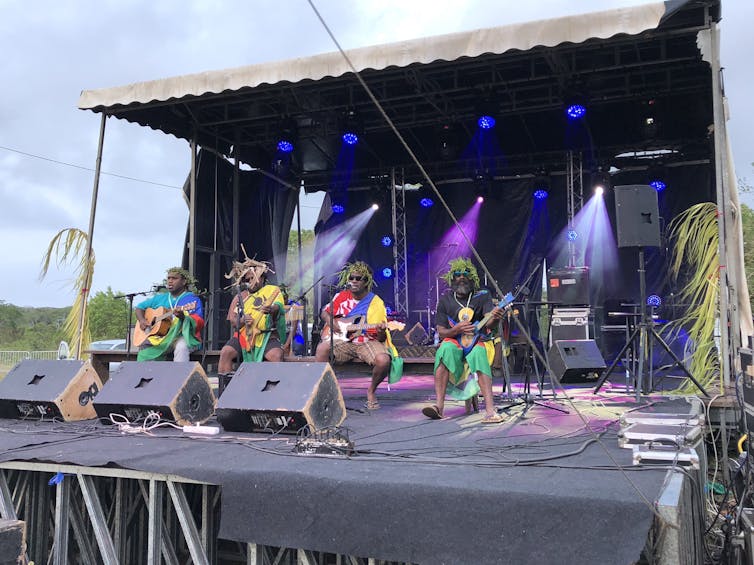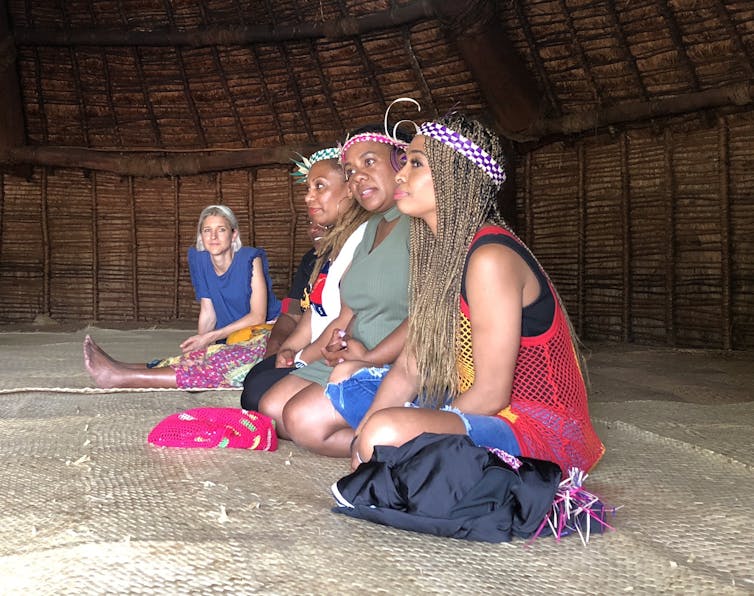the protest songs of New Caledonia's independence referendum
- Written by Michael Webb, Lecturer in music education and ethnomusicology, University of Sydney
On November 4, New Caledonians will go to the polls to vote for either continued French governance, or independence.
Many Australians, who might holiday there to taste French culture in the Pacific, are unaware of the continuing struggle for sovereignty of the Kanak people (Indigenous New Caldeonians) since the catastrophe of their colonisation by France in 1853. This struggle has often been told through music.
Our research looks at the role of music in political struggles in Melanesia, particularly in West Papua and New Caledonia. Across Melanesia, music is not only evidence of ancient and living cultures, it is also a celebration of Indigenous resistance, agency and resilience.
Songs of resistance
Just now in the street I saw my children Advancing, shouting “Freedom!” The high school was empty, where are the youth? In the streets the city was in protest
Written in 1985, these opening lines, from pioneer Kanak protest singer Jean-Pierre Swan’s song Liberté, refer to les évènements, “the Events”. These were a bloody civil war in New Caledonia in the 1980s that culminated in the massacre of 19 Kanaks by French commandos in 1988, and the assassination in 1989 of the great Melanesian pacifist independence campaigner, Jean-Marie Tjibaou.
Resistance to French rule has ebbed and flowed since French annexation but was re-energised in 1969 with the formation of the Foulards Rouges (the Red Scarves), a group that combined anti-colonial leftism and Pacific cultural nationalism.
The Red Scarves were led by Nidoish Naisseline, heir to a high chief, whose arrest and imprisonment in September 1969 sparked a riot and ultimately, the Kanak Awakening, a period of intense Indigenous resistance to overseas occupation.
This movement was immortalised in the song, Jamulo Ataï, with lyrics penned by Naisseline himself. Jamulo, in the title, was Naisseline’s nickname and Ataï was the 19th century Kanak resistance leader. By pairing his name with Ataï’s, Naisseline was equating himself to the great leader.
One verse of the song mentions the quest for self-rule:
In September ’69 The crown of Jamulo remains And we will support it forever Leave the natives their independence
Almost a century before, in 1878, Ataï had led an uprising in which 1,200 Melanesians were slaughtered. Ataï was assassinated and his head sent to France as a trophy.
In the mid 1980s, Kanak musician and intellectual Théo Menango’s funk-rock band, Yata (Ataï in reverse), looked to the past for inspiration, memorialising the slain hero in a song that provocatively compared him with Christ:
Ataï the pure, the steadfast, the great saint Like Christ your blood was shed Ataï your name must last Like Christ your work is immortal Ataï, oh, you’re revealing to me the path to take In your footsteps is freedom!
Past traumas
The relentless drive to dismantle Kanak culture and shut down anti-colonial protest gave birth in the 1980s to the kaneka music genre, which combined musical elements and the Black pride and rights stance of Jamaican reggae with the “tchap” rhythm and sound of Indigenous percussion instruments.
There was an outpouring of kaneka songs marking past and present traumatic events and injustices. Here is a selection:
Ouvanu by the kaneka band Waan, remembers the guillotining on the orders of the colonial governor in 1868 of 10 Kanak men at Ouvanu in Puébo, in the north of Grand Terre (the large island of New Caledonia).
The lament Loulou by the kaneka band Bwanjep, refers to the night ambush by settlers at Wan’yaat in 1984 of several cars containing prominent Kanaks.
Ten people were shot, including two brothers of the visionary Kanak leader Jean-Marie Tjibaou. One of them was nicknamed Loulou.
Homage a Eloi Machoro by the kaneka band JDVK, celebrates Eloi Machoro, the Kanak militant who became known as a destroyer of ballot boxes.
He was shot dead in 1985 by police a few kilometres from where Chief Atai had fallen 110 years earlier.
Gossanah Iaai by the kaneka band Nodeak documents the massacre by French Special Forces of 19 Kanaks in the Gossanah caves on Ouvéa in the Loyalty Islands in 1988.
A music festival
A year ago, we flew to Lifou in the Loyalty Islands for Fest Mela, a weekend music event at the town of Hapetra organised by the kaneka superstar, Edou Wamai, who lives locally.
Fest Mela was headlined by the Melbourne-based West Papuan group, Black Sistaz, who are daughters of the renowned West Papuan independence activist band of the 1980s, the Black Brothers.
 Members of Kool Groove at Fest Mela, draped in the Kanak flag.
Michael Webb
Members of Kool Groove at Fest Mela, draped in the Kanak flag.
Michael Webb
The roster of local bands included Kool Groove who played a local style of guitar-based folk music. Draped in the Kanak flag, members expressed pride in their local language, culture and future nation.
On Lifou, we were received by the Chief of Hapetra, who requested that the Black Sistaz sing for him. They responded with a moving a cappella song from the island of Biak in West Papua.
 Black Sistaz singing for the Chief at Hapetra.
Michael Webb
Black Sistaz singing for the Chief at Hapetra.
Michael Webb
As Melanesian nations still under colonial rule, West Papuans and Kanaks consider their fate to be intertwined — each believes the other can assist in achieving sovereignty over their own soil. Kanak musicians have also composed songs advocating for an independent West Papua, such as Free West Papua by the acoustic kaneka band, Lyric Kanak Gong.
In Melanesia, at crucial moments when the destiny of Pacific First Peoples is being decided, such as in this week’s referendum, songs can remind of past sacrifices and help to imagine possible futures.
Our thanks to Rosie Makalu, Eric Gawe and Nina Soler in Kanaky (New Caledonia).
Authors: Michael Webb, Lecturer in music education and ethnomusicology, University of Sydney





